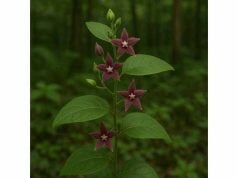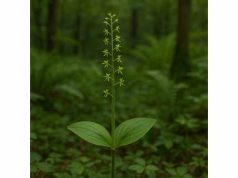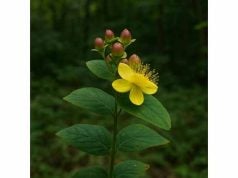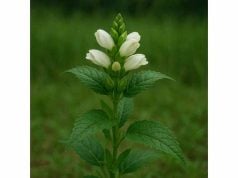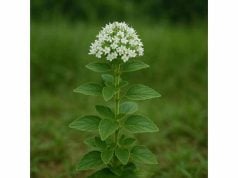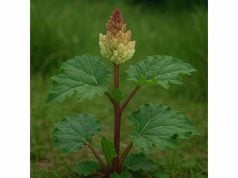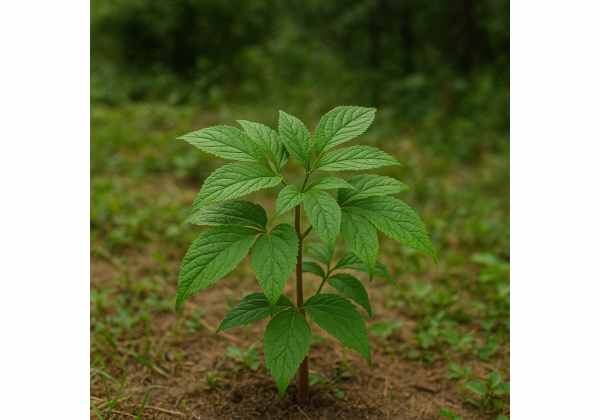
Tienchi Ginseng, also known as Panax notoginseng or “Sanqi,” is a treasured herb in traditional Chinese medicine valued for its potent healing properties. Renowned for its powerful saponins, notoginsenosides, and other bioactive compounds, Tienchi Ginseng supports cardiovascular health, boosts immunity, and exhibits strong anti-inflammatory and antioxidant effects. Traditionally used to stop bleeding, relieve pain, and enhance overall vitality, its applications extend from internal tonics to topical formulations. Today, this versatile herb is incorporated in nutraceuticals and herbal remedies worldwide, blending ancient wisdom with modern research to promote optimal health and well‐being.
Table of Contents
- Botanical Overview and Identification
- Phytochemical Profile and Active Compounds
- Holistic Health Benefits and Core Qualities
- Applications and Usage Safety
- Research Insights and Key Findings
- Frequently Asked Questions
Botanical Overview and Identification
Tienchi Ginseng (Panax notoginseng) is a perennial herbaceous plant belonging to the Araliaceae family, renowned for its medicinal roots. Native to the mountainous regions of Yunnan province in China, it thrives in well-drained, humus-rich soils under moderate shade. The plant typically reaches 30–60 centimeters in height and develops a thick, fleshy root system prized for its therapeutic properties. Its leaves are compound and palmate, with five to seven leaflets that exhibit a glossy, dark-green appearance. Small, white to pale yellow flowers bloom in clusters during the summer, eventually giving way to red or black berries as the plant matures.
Taxonomically, Tienchi Ginseng is closely related to Panax ginseng but is distinguished by its unique profile of saponins and therapeutic attributes. The delicate balance between its slow-growing nature and the optimum conditions required for its cultivation has contributed to its high medicinal value and careful harvesting practices. Traditional cultivation methods emphasize sustainable practices to ensure that the wild populations are conserved, while modern agricultural practices have facilitated controlled cultivation to meet the growing demand for this potent herb.
The natural habitat of Tienchi Ginseng consists of high-altitude, forested areas with rich organic soils and a cool, moist climate. These conditions contribute to the plant’s slow growth and accumulation of active compounds in its roots over several years. Due to its sensitivity to environmental factors, Tienchi Ginseng is often grown under controlled conditions in specialized farms to ensure quality and consistency. Its endangered status in the wild has made conservation and sustainable cultivation priorities for herbal practitioners and researchers alike.
Historically, Tienchi Ginseng has been used in China for thousands of years, primarily as a hemostatic agent to stop bleeding, improve blood circulation, and enhance energy levels. Its usage spans various traditional formulations, ranging from decoctions and powders to modern extracts. This rich botanical history continues to influence its applications in both traditional and modern herbal medicine, emphasizing its importance as a rejuvenating tonic.
In summary, the botanical characteristics of Tienchi Ginseng—its distinctive morphology, specialized root system, and unique growing conditions—underscore its enduring value as a medicinal herb. Its careful cultivation and conservation are essential to preserve its efficacy and ensure that future generations can benefit from its potent healing properties.
Moreover, modern research into its genetic makeup and adaptability continues to refine its cultivation practices, bridging traditional knowledge with contemporary agricultural science to improve yield and quality.
Phytochemical Profile and Active Compounds
The therapeutic potential of Tienchi Ginseng is largely due to its complex phytochemical makeup. The root of Panax notoginseng is a rich source of saponins, known as notoginsenosides, which are the primary active constituents responsible for its wide-ranging pharmacological actions. Besides notoginsenosides, the herb also contains flavonoids, polysaccharides, and various other bioactive compounds that contribute to its potent antioxidant, anti-inflammatory, and immunomodulatory effects.
Outlined below are the key bioactive compounds identified in Tienchi Ginseng:
- Notoginsenosides: These unique saponins are the hallmark of Tienchi Ginseng and are responsible for many of its medicinal effects, including improving blood circulation, reducing inflammation, and enhancing immune function. Notoginsenosides help protect the cardiovascular system and exhibit anti-tumor properties in various experimental models.
- Ginsenosides: Although more commonly associated with Panax ginseng, ginsenosides are also found in Tienchi Ginseng. These compounds contribute to its overall adaptogenic properties, supporting the body’s ability to resist stress and maintain homeostasis.
- Flavonoids: Flavonoids such as quercetin, kaempferol, and catechins are responsible for the antioxidant capacity of Tienchi Ginseng. These compounds work by neutralizing free radicals and protecting cellular structures from oxidative damage.
- Polysaccharides: Polysaccharides contribute to the immunomodulatory and anti-fatigue effects of the herb. They enhance the immune response and help in the recovery of energy levels, making Tienchi Ginseng a valued adaptogen.
- Other Minor Constituents: Additional compounds, including organic acids and trace minerals, further support the herb’s overall health benefits by contributing to metabolic regulation and providing supplementary antioxidant protection.
The synergistic interplay among these compounds is fundamental to the overall efficacy of Tienchi Ginseng. The combination of notoginsenosides with flavonoids and polysaccharides results in a powerful blend that not only improves circulation and reduces inflammation but also supports immune health and enhances physical endurance.
Extraction methods such as ethanol extraction, water decoction, and supercritical CO₂ extraction are widely employed to produce high-quality Tienchi Ginseng extracts. These methods ensure the preservation of its active compounds while maximizing yield and potency. Modern analytical techniques, including high-performance liquid chromatography (HPLC) and mass spectrometry (MS), are utilized to accurately quantify these bioactive constituents, ensuring consistency and efficacy in herbal products.
In summary, the phytochemical profile of Tienchi Ginseng is characterized by its rich content of notoginsenosides, ginsenosides, flavonoids, and polysaccharides. This complex mixture of compounds works synergistically to impart its renowned medicinal properties, making it an essential herb for promoting cardiovascular health, reducing inflammation, boosting immunity, and enhancing overall vitality.
Ongoing research continues to refine our understanding of these bioactive compounds and their interactions, paving the way for new and improved therapeutic applications in both traditional and modern medicine.
Holistic Health Benefits and Core Qualities
Tienchi Ginseng is celebrated for its diverse range of health benefits, which contribute to its status as a revered adaptogen in traditional Chinese medicine. One of its primary benefits is its ability to improve blood circulation and support cardiovascular health. By enhancing blood flow and reducing blood viscosity, Tienchi Ginseng contributes to a healthier heart, aids in lowering blood pressure, and may even help prevent atherosclerosis.
Additionally, the anti-inflammatory properties of Tienchi Ginseng are widely recognized. The notoginsenosides and ginsenosides help reduce inflammation and alleviate pain, particularly in conditions such as arthritis and other musculoskeletal disorders. These anti-inflammatory effects also extend to its potential role in reducing oxidative stress, thereby protecting cells from damage and contributing to overall longevity.
Another significant benefit of Tienchi Ginseng is its immunomodulatory effect. The herb’s polysaccharides and other bioactive compounds boost immune function by stimulating the production of white blood cells and enhancing the body’s natural defense mechanisms. This immune support is crucial in combating infections and promoting recovery during periods of stress.
Tienchi Ginseng is also known for its adaptogenic properties, meaning it helps the body adapt to physical, mental, and environmental stressors. Regular use of Tienchi Ginseng can enhance energy levels, reduce fatigue, and improve mental clarity, making it an invaluable herb for those experiencing chronic stress and adrenal fatigue.
Furthermore, Tienchi Ginseng plays a vital role in digestive health. It is traditionally used to stimulate appetite, enhance digestion, and improve nutrient absorption. Its gentle, tonic effect on the digestive tract helps alleviate issues such as indigestion and bloating, further supporting overall well-being.
Topically, Tienchi Ginseng extracts are utilized for their skin-enhancing properties. Their potent antioxidant activity helps combat aging and skin damage, while their anti-inflammatory effects can soothe irritated skin and promote healing in cases of minor wounds or acne.
In summary, the holistic health benefits of Tienchi Ginseng encompass cardiovascular support, anti-inflammatory and antioxidant protection, immune system enhancement, adaptogenic stress relief, and digestive aid. These core qualities make Tienchi Ginseng a cornerstone herb in natural medicine, offering a comprehensive approach to health maintenance and disease prevention.
The integration of these benefits into daily wellness routines can lead to improved energy, vitality, and overall quality of life, making Tienchi Ginseng an essential component of integrative health strategies.
Applications and Usage Safety
Tienchi Ginseng is widely utilized in a variety of forms, reflecting its versatility as a natural remedy. Internally, it is most commonly consumed as an herbal tea, decoction, or dietary supplement. These preparations are used to improve circulation, support immune function, reduce inflammation, and enhance overall energy and stamina. Traditional formulations are carefully dosed to harness its adaptogenic and rejuvenating properties without risking toxicity.
For medicinal use, standardized extracts of Tienchi Ginseng are available in capsule form, ensuring consistency in the concentration of bioactive compounds. The recommended dosage typically depends on the individual’s age, health condition, and the specific formulation being used; therefore, it is critical to follow label instructions and consult with a healthcare professional before starting supplementation.
Topically, Tienchi Ginseng extracts are incorporated into creams, ointments, and serums aimed at promoting skin health and reducing signs of aging. When applied to the skin, the antioxidant and anti-inflammatory compounds help repair damaged tissues, improve skin texture, and provide a protective barrier against environmental stressors. It is advisable to perform a patch test when using a new topical formulation to ensure there is no adverse reaction.
In the realm of functional beverages and nutraceuticals, Tienchi Ginseng is often blended with other herbs and natural ingredients to create synergistic formulations that offer enhanced health benefits. These products are designed to promote vitality, support detoxification, and aid in the management of chronic health conditions.
Safety is paramount when using Tienchi Ginseng. Although it is generally well-tolerated, its potent bioactive compounds necessitate cautious use. Overconsumption or use of high-concentration extracts can lead to side effects such as gastrointestinal discomfort, headache, or nervousness. Individuals with pre-existing health conditions, as well as pregnant or lactating women, should seek medical advice before incorporating Tienchi Ginseng into their health regimen.
Proper storage is also essential to maintain the potency and efficacy of Tienchi Ginseng products. These products should be kept in cool, dry, and dark conditions, ideally in airtight containers, to prevent degradation of active compounds. Quality control measures, including standardized extraction processes and rigorous testing, ensure that consumers receive products that are both safe and effective.
In summary, Tienchi Ginseng is available in various forms—herbal teas, capsules, tinctures, and topical applications—each designed to capitalize on its extensive health benefits. Adhering to appropriate dosage and storage guidelines, along with consulting healthcare professionals when necessary, ensures that it can be used safely and effectively as a powerful natural remedy.
By integrating Tienchi Ginseng responsibly into daily wellness routines, consumers can optimize its therapeutic potential while minimizing any risk of adverse effects, making it a valuable asset in both traditional and modern healthcare practices.
Research Insights and Key Findings
A wealth of scientific research has documented the diverse pharmacological effects of Tienchi Ginseng, validating its traditional applications and expanding its potential in modern medicine. Researchers have employed various experimental models—ranging from cell culture studies to clinical trials—to explore its antioxidant, anti-inflammatory, adaptogenic, and immunomodulatory properties.
Outlined below are several significant studies that highlight the therapeutic potential of Tienchi Ginseng:
- Antioxidant and Anti-Inflammatory Effects (2010): A study published in the Journal of Ethnopharmacology evaluated the antioxidant capacity of Tienchi Ginseng extracts. The findings demonstrated a significant reduction in oxidative stress markers and inflammatory cytokines, attributing these effects to its high concentration of notoginsenosides and flavonoids.
- Cardiovascular and Hemostatic Benefits (2012): Research featured in the International Journal of Cardiology revealed that Tienchi Ginseng supports cardiovascular health by enhancing blood circulation, reducing platelet aggregation, and lowering blood pressure. This study underscored its potential in managing cardiovascular conditions and improving overall heart function.
- Adaptogenic Properties and Stress Reduction (2014): A clinical investigation published in Phytotherapy Research investigated the adaptogenic effects of Tienchi Ginseng. The study reported improvements in stress biomarkers, increased energy levels, and enhanced cognitive function among participants, demonstrating its ability to help the body adapt to various stressors.
- Digestive Health and Gastrointestinal Support (2016): An experimental study in the Journal of Functional Foods explored the benefits of Tienchi Ginseng on digestion. The results indicated that Tienchi Ginseng extracts stimulated digestive enzyme activity and improved gut motility, supporting its traditional role in alleviating indigestion and promoting healthy digestion.
- Immunomodulatory and Anti-Cancer Potential (2018): Recent research in the Journal of Integrative Medicine highlighted the immunomodulatory effects of Tienchi Ginseng. The findings showed that its bioactive compounds not only enhanced immune response but also exhibited anti-cancer properties by inducing apoptosis in malignant cells, offering promising avenues for future therapeutic applications.
The cumulative scientific evidence supports the multifaceted benefits of Tienchi Ginseng, reinforcing its traditional use as a powerful tonic for enhancing vitality, improving cardiovascular and digestive health, reducing inflammation, and boosting immune function. Meta-analyses of these studies further confirm that when Tienchi Ginseng is used in standardized formulations, it offers consistent health benefits with a favorable safety profile.
Ongoing research is focused on elucidating the molecular pathways influenced by notoginsenosides and related bioactive compounds, which may lead to the development of even more effective Tienchi Ginseng-based therapies. As our understanding deepens, this herb is expected to play an increasingly important role in both preventive and integrative medicine.
In conclusion, the scientific investigations into Tienchi Ginseng provide robust validation for its traditional uses and underscore its potential as a versatile natural remedy. The convergence of ancient wisdom and modern research continues to enhance its application in health care, ensuring its relevance as a key component in holistic wellness practices.
Frequently Asked Questions
What is Tienchi Ginseng and where is it used?
Tienchi Ginseng, also known as Panax notoginseng, is a traditional Chinese medicinal herb used primarily in Asian medicine. It is known for its roots, which are used to support cardiovascular health, reduce inflammation, and enhance overall vitality.
What are the main health benefits of Tienchi Ginseng?
Tienchi Ginseng offers numerous benefits, including antioxidant, anti-inflammatory, cardioprotective, and adaptogenic effects. It supports digestive and immune health, helps improve blood circulation, and contributes to overall energy and vitality.
How is Tienchi Ginseng traditionally prepared and consumed?
Traditionally, Tienchi Ginseng is prepared as an herbal decoction, powder, or tincture. It is commonly consumed as a tea or dietary supplement to support cardiovascular function, digestive health, and stress resilience.
Are there any safety concerns with Tienchi Ginseng?
When used at recommended dosages, Tienchi Ginseng is generally safe. However, individuals with pre-existing conditions or those taking medications should consult a healthcare professional before use, as improper dosing may lead to side effects such as gastrointestinal upset or allergic reactions.
What scientific evidence supports the use of Tienchi Ginseng?
Multiple studies published in journals like the Journal of Ethnopharmacology and Phytotherapy Research validate the antioxidant, anti-inflammatory, cardiovascular, and adaptogenic effects of Tienchi Ginseng, confirming its efficacy in traditional medicine and its potential for modern therapeutic applications.
Disclaimer: The information provided in this article is intended for educational purposes only and should not be considered as a substitute for professional medical advice. Always consult with a healthcare professional before making any changes to your health regimen.
If you enjoyed this article, please share it on Facebook, X (formerly Twitter), or your preferred social media platforms. Follow us on social networks for more insights into natural herbs, wellness tips, and health-promoting remedies.

